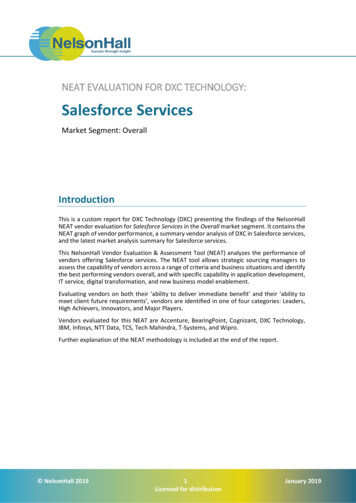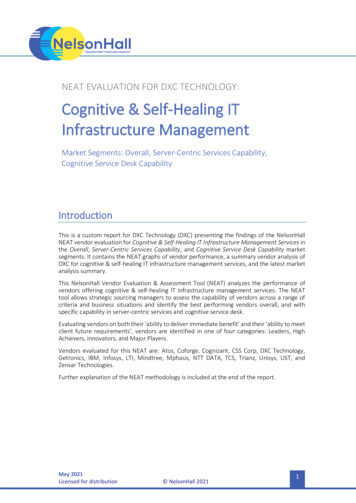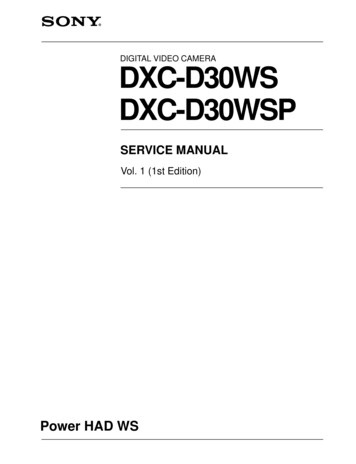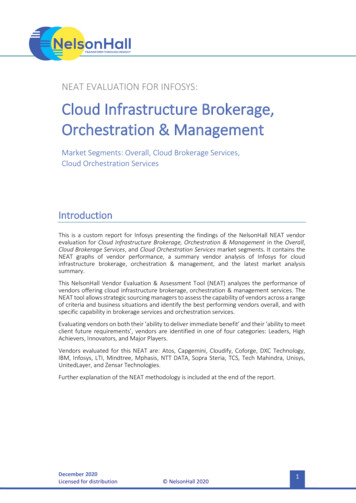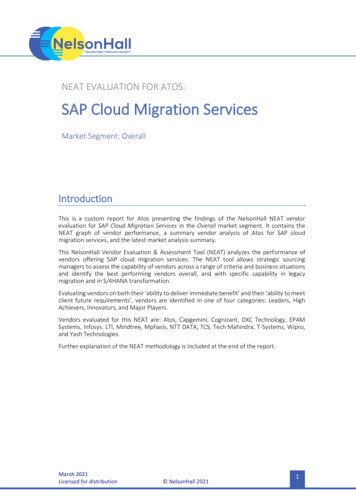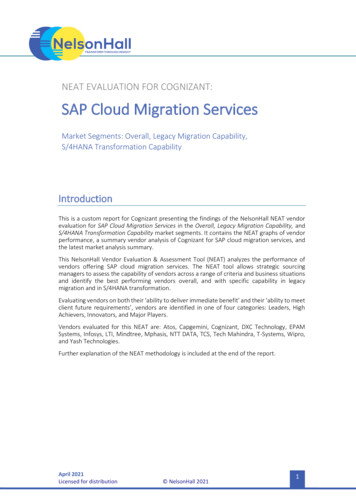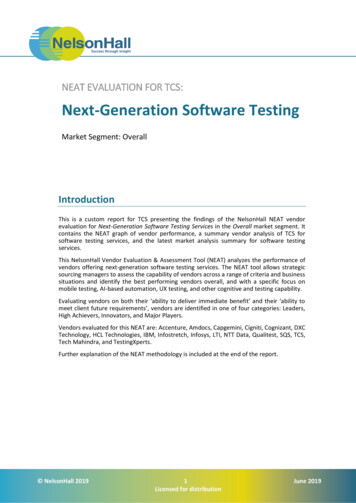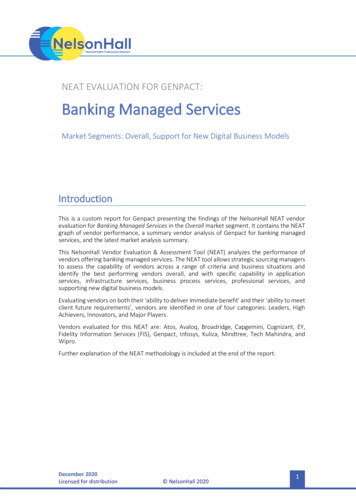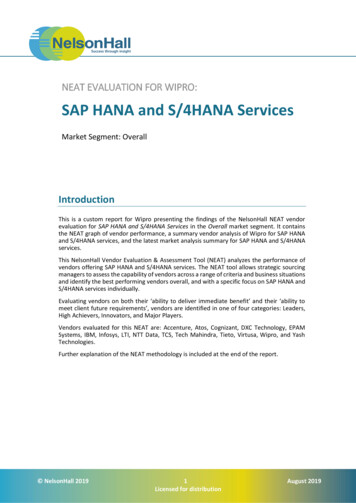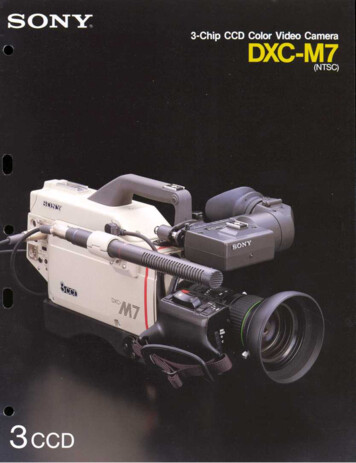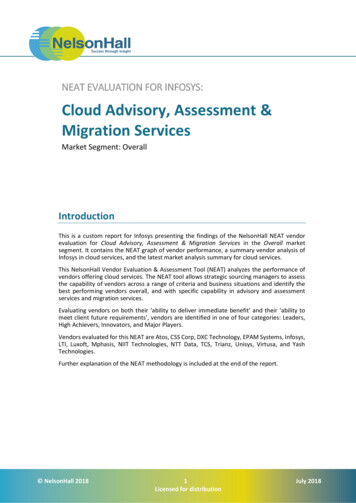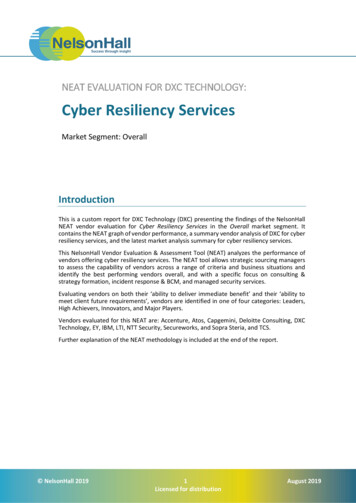
Transcription
NEAT EVALUATION FOR DXC TECHNOLOGY:Cyber Resiliency ServicesMarket Segment: OverallIntroductionThis is a custom report for DXC Technology (DXC) presenting the findings of the NelsonHallNEAT vendor evaluation for Cyber Resiliency Services in the Overall market segment. Itcontains the NEAT graph of vendor performance, a summary vendor analysis of DXC for cyberresiliency services, and the latest market analysis summary for cyber resiliency services.This NelsonHall Vendor Evaluation & Assessment Tool (NEAT) analyzes the performance ofvendors offering cyber resiliency services. The NEAT tool allows strategic sourcing managersto assess the capability of vendors across a range of criteria and business situations andidentify the best performing vendors overall, and with a specific focus on consulting &strategy formation, incident response & BCM, and managed security services.Evaluating vendors on both their ‘ability to deliver immediate benefit’ and their ‘ability tomeet client future requirements’, vendors are identified in one of four categories: Leaders,High Achievers, Innovators, and Major Players.Vendors evaluated for this NEAT are: Accenture, Atos, Capgemini, Deloitte Consulting, DXCTechnology, EY, IBM, LTI, NTT Security, Secureworks, and Sopra Steria, and TCS.Further explanation of the NEAT methodology is included at the end of the report. NelsonHall 20191Licensed for distributionAugust 2019
NEAT Evaluation for DXC Technology: Cyber Resiliency ServicesNEAT Evaluation: Cyber Resiliency Services (Overall)NelsonHall has identified DXC as a Leader in the Overall market segment, as shown in theNEAT graph. This market segment reflects DXC’s overall ability to meet future clientrequirements as well as delivering immediate benefits to cyber resiliency services clients.Leaders are vendors that exhibit both a high ability relative to their peers to deliverimmediate benefit and a high capability relative to their peers to meet client futurerequirements.Buy-side organizations can access the Cyber Resiliency Services NEAT tool (Overall) here. NelsonHall 20192Licensed for distributionAugust 2019
NEAT Evaluation for DXC Technology: Cyber Resiliency ServicesVendor Analysis Summary for DXC TechnologyOverviewDXC’s cybersecurity services reside within its infrastructure technology service business withits cloud, workload platforms, and its workplace, mobility and security solutions. Security isalso one of the components of DXC’s digital business ( 17% of revenues) along with cloudapps, consulting, analytics, and cloud infrastructure.DXC’s security services provide an end-to-end security offering from advisory to architecture,implementation, and management. DXC’s approach is to protect, detect, and secure clients’operations throughout digital transformations. Security services include security advisoryservices and managed security services for: Security risk management Intelligent security operations Identity and Access Management (IAM) Infrastructure and endpoint security Data protection and privacy.Advisory services include risk management, including DXC’s security diagnostics servicesleveraging Cyber Maturity Reviews (CMRs): ‘foundation,’ ‘full,’ ‘GDPR deep dive’, and‘ransomware deep dive’. The CMR consists of structured reports around 24 capabilities, whattechnical security controls the client has, and how they are managed vs. strategic andregulatory requirements.Managed security services include DXC’s intelligent security operations that monitor theclient’s environments and reduce the complexity of securing the IT environment. DXC’s threatintelligence platform is being designed to be increasingly modular, collecting securityinformation from a number of different sources including ArcSight, which currently is theleading log collection platform, into a Hadoop data lake for analysis.DXC operates two tiers of 24x7x365 security operations center: global security operationscenters and regional security operations centers. Its global security operations centers(GSOCs) are based in: U.S. – Plano, Texas and Newark, Delaware U.K. – Aldershot Australia – Sydney.DXC’s three forensic response centers are co-located in SOCs in the U.S., U.K., and Bulgaria.DXC has 3.5k security and compliance FTEs. NelsonHall 20193Licensed for distributionAugust 2019
NEAT Evaluation for DXC Technology: Cyber Resiliency ServicesFinancialsNelsonHall estimates DXC’s CY18 revenue to be 21.8bn. Within its Global InfrastructureServices (GIS) line which includes enterprise cloud apps, consulting, security, analytics, andcloud, revenue was 12.2bn. NelsonHall also estimates that DXC resiliency revenues to be 880m up 8%, with the following estimated breakdown, by geography: Americas: 50% ( 440m) EMEA: 45% ( 410m) APAC: 5% ( 50m).Strengths The ability to offer cybersecurity as part of an end-to-end IT services capability; as part ofthis capability, DXC has a greater ability to know the client’s business and can betterrespond to threats and build plans for business continuity One of the largest security research capabilities used to develop detailed blueprints andwork packages in its CRA to enable DXC to provide clients with quick implementationsand estimations of service DXC has a large scale in cybersecurity, demonstrated by its global network of SOCs and4k cybersecurity FTEs that can support the majority of large-scale security contracts.Challenges Clients are more open to multi-sourcing and less likely to opt for an all-in-one servicefrom an end-to-end security provider or provider that offers security in support of an ITservices contract, such as DXC Competition from lower price MSSPs expanding service offerings into more advancedsecurity services Competition from the consultancies for services benefiting from third-party arbiters suchas auditing, and consultancy for legal/compliance. The consultancies are currently in theprogress of building out MSS capabilities, and although this lacks as deep a knowledge ofthe client’s operations from an IT services capability, each has industry knowledge.Strategic DirectionFollowing two years of portfolio rationalization following the merger of HPE and CSC’ssecurity units, DXC security has produced a roadmap for 2020-2022 that includes: Further integration into the ‘platform DXC’ and Bionix initiatives. Through furtherintegration into platform DXC, DXC will be able to further leverage automation acrossservices provided for clients, i.e. providing more automated response services with DXCBionix Further focus of cloud and IoT/OT first across industries, then focusing on industryspecific offerings (see below) NelsonHall 20194Licensed for distributionAugust 2019
NEAT Evaluation for DXC Technology: Cyber Resiliency Services A deeper alignment to industry sectors through the build of industry-specific points ofview and industry-specific blueprints, playbooks, and offerings. Target verticals for thebuild of industry-specific IoT offerings include manufacturing, energy and utilities,healthcare, and transportation As part of the strategy, DXC will look to integrate more AI into security services, tocontinue the use of AI for analytics and towards the end of the period, investing inservices for the security of AI systems.OutlookDXC has extensive cybersecurity research capabilities, numerous blueprints and playbookssuch as the CRA to enable DXC to protect client environments quickly and more fully.DXC aims to provide resiliency as part of a wider IT services engagement for which it wouldhave a deeper knowledge of client business operations and be more able to support largeenterprises in becoming and remaining resilient.As DXC invests in more advanced security services and focuses on the likes of AI, IoT, andbots, it will introduce more services to cater to these offerings, and as such will be focusingmore on industry-specific offerings. NelsonHall 20195Licensed for distributionAugust 2019
NEAT Evaluation for DXC Technology: Cyber Resiliency ServicesCyber Resiliency Services Market SummaryBuy-Side DynamicsKey challenges for organizations looking to outsource cyber resiliency services are: Organizations traditionally separating cybersecurity from business operations, withCISOs often struggling to present business cases and ROI for cybersecurity and buildresponses into BCM plans An increasing number of applicable regulations for organizations to meet, includingthose set from regions other than the organization’s operational location. These are toooften seen as the standard level of defense, despite lagging behind new technologiessuch as IoT and blockchain Organizations having a large number of legacy applications that require investment topatch. Organizations may find this patching process uneconomical weighed against therisk of being attacked Cybersecurity talent continues to be incredibly hard to hire, even more so for candidateswith a business background who can relate the issues of cybersecurity to theorganization’s operations Increased sophistication of attacks, with hackers using exploits developed by statesponsored organizations that further their spread or make recognizing spoofing moredifficult An increasing amount of data being collected on customers which, should they bebreached, can damage the organization's reputation The often-overlooked human factor of cybersecurity: users are unaware of what IoCslook like and how to react to an IoC.Market Size & GrowthThe current global resiliency services market size is estimated by NelsonHall at 22.5bn andwill grow to 49bn by 2023, a CAGR of 16.8%.Growth will be driven by: Clients building resiliency into other operations, i.e. DevSecOps Regulations increasing minimum standards New technologies such as IoT, blockchain, and later, quantum computing.North America accounts for 44% of the cyber resiliency market, and is the most matureregion. Growth in North America is being driven by clients adopting services to addcybersecurity into BCM plans.APAC cyber resiliency is generally less mature than in its Western counterparts. A growthdriver in APAC will be the high use of IoT technologies. NelsonHall 20196Licensed for distributionAugust 2019
NEAT Evaluation for DXC Technology: Cyber Resiliency ServicesSuccess FactorsCritical success factors for vendors within the resiliency services market are: Security brought into client discussions early Close ties between IT services, business operations, and cybersecurity Use of ML/AI tools to detect and reduce the MTTD and MTTR of threats, and reduce therequirement to have as many L1/L2 security analysts investigating events Industry expertise in both the threat database and in the consulting and management ofresiliency to truly understand industry best practices, in addition to the typical threatsand regulations to which the client is subject Being able to look beyond the role of the employee to assess the minimal access requiredto operate as part of insider protection/data segmentation Understanding the client business and the security market enough to provider ROIs onintegrating a security tool/provide a service Developing delivery capabilities in support of onshore delivery should the contractrequire it for regulatory purposes (e.g. mission critical infrastructure) Positioning as a thought leader in resiliency with strong connections with the C-level andwith nation states/regulatory bodies.OutlookOver the next few years: Security strategies will be developed alongside business operations and BCM plans, asorganizations deal with the use of technologies such as IoT Training will be developed and deployed across organizations to which users respondpositively and view it less as a box ticking exercise; self-service reference guides andchecking facilities will be deployed in organizations ML and AI will practically eliminate L1/L2 SIEM services, and the development of newtechnologies will enable detection of unusual network activities Security testing activities to become further divided across automated efforts withsecurity tools, and with advanced manual red team testing that examines the likes ofphysical security Application security is to be baked into ADM activities as vendors mature DevSecOpsactivities Advanced ML technologies that replace or support typical role-based accessmanagement and further use of IoT to manage access by location Further regulations to be developed at the region and industry level for which vendorswill develop further technologies for automatically detecting changes in the client’soperation that breach regulations Cloud providers to continue to develop security technologies as a differentiator, withvendors providing management of these in-built security tools NelsonHall 20197Licensed for distributionAugust 2019
NEAT Evaluation for DXC Technology: Cyber Resiliency Services Further development of tools and technologies, and changes in client attitudes toautomated remediation of security events Cybersecurity will be truly valued in BCM setups and involve security early in theestablishment of BCM plans. Incident response plans in general to consider thereputational damage of an event. NelsonHall 20198Licensed for distributionAugust 2019
NEAT Evaluation for DXC Technology: Cyber Resiliency ServicesNEAT Methodology for Cyber Resiliency ServicesNelsonHall’s (vendor) Evaluation & Assessment Tool (NEAT) is a method by which strategicsourcing managers can evaluate outsourcing vendors and is part of NelsonHall's Speed-toSource initiative. The NEAT tool sits at the front-end of the vendor screening process andconsists of a two-axis model: assessing vendors against their ‘ability to deliver immediatebenefit’ to buy-side organizations and their ‘ability to meet client future requirements’. Thelatter axis is a pragmatic assessment of the vendor's ability to take clients on an innovationjourney over the lifetime of their next contract.The ‘ability to deliver immediate benefit’ assessment is based on the criteria shown in Exhibit1, typically reflecting the current maturity of the vendor’s offerings, delivery capability,benefits achievement on behalf of clients, and customer presence.The ‘ability to meet client future requirements’ assessment is based on the criteria shown inExhibit 2, and provides a measure of the extent to which the supplier is well-positioned tosupport the customer journey over the life of a contract. This includes criteria such as thelevel of partnership established with clients, the mechanisms in place to drive innovation, thelevel of investment in the service, and the financial stability of the vendor.The vendors covered in NelsonHall NEAT projects are typically the leaders in their fields.However, within this context, the categorization of vendors within NelsonHall NEAT projectsis as follows: Leaders: vendors that exhibit both a high ability relative to their peers to deliverimmediate benefit and a high capability relative to their peers to meet client futurerequirements High Achievers: vendors that exhibit a high ability relative to their peers to deliverimmediate benefit but have scope to enhance their ability to meet client futurerequirements Innovators: vendors that exhibit a high capability relative to their peers to meet clientfuture requirements but have scope to enhance their ability to deliver immediate benefit Major Players: other significant vendors for this service type.The scoring of the vendors is based on a combination of analyst assessment, principallyaround measurements of the ability to deliver immediate benefit; and feedback frominterviewing of vendor clients, principally in support of measurements of levels of partnershipand ability to meet future client requirements. NelsonHall 20199Licensed for distributionAugust 2019
NEAT Evaluation for DXC Technology: Cyber Resiliency ServicesExhibit 1‘Ability to deliver immediate benefit’: Assessment criteriaAssessment CategoryAssessment CriteriaOfferingsSimulation or espionage servicesCyber resiliency strategy developmentLegal consultancy services for cybersecurityPenetration testingSIEMApplication securityEndpoint and edge securityIdentity management servicesSecurity compliance servicesIncident response services Backup and recovery servicesLevel of automation/cognitive security capabilitiesDeliveryDelivery in support of U.S.Delivery in support of U.K.Delivery in support of Rest of EMEADelivery in support of APACDelivery in support of LATAMOnsite support of MSSLanguage supportScale of FTE supportSecurity IPSingle touch pointPresenceFinancial services security presenceGovernment security presenceManufacturing security presenceRetail security presenceEnergy & utilities security presenceBenefits AchievedDetection and response timeResponse to cyber threatsValue for moneyThreat avoidanceAbility to remain in compliance with regulationImproved visibility through dashboard or portalImproved staff knowledge NelsonHall 201910Licensed for distributionAugust 2019
NEAT Evaluation for DXC Technology: Cyber Resiliency ServicesExhibit 2‘Ability to meet client future requirements’: Assessment criteriaAssessment CategoryAssessment CriteriaFuture Offerings & DeliveryArea of investment in centers: onshoreArea of investment in centers: offshoreInvestment into cyber consultancy services including simulationand espionage servicesInvestment into legal consultancy services for cybersecurityInvestment into network securityInvestment into application securityInvestment into advanced security servicesInvestment into backup and recovery servicesInvestment in automation/cognitive security capabilitiesInvestment into security dashboardsCommitment to CyberResiliencyOutlook for revenue expansionStrength of partnershipLikelihood of recommendingFor more information on other NelsonHall NEAT evaluations, please contact the NelsonHallrelationship manager listed below.Sales EnquiriesNelsonHall will be pleased to discuss how we can bring benefit to your organization. You can contactus via the following relationship manager:research.nelson-hall.comSimon Rodd at simon.rodd@nelson-hall.comImportant NoticeCopyright 2019 by NelsonHall. All rights reserved. NelsonHall exercises its best efforts in preparation of the information provided in this reportand believes the information contained herein to be accurate. However, NelsonHall shall have no liability for any loss or expense that may resultfrom incompleteness or inaccuracy of the information provided. NelsonHall 201911Licensed for distributionAugust 2019
vendors offering cyber resiliency services. The NEAT tool allows strategic sourcing managers . and cloud infrastructure. DXs security services provide an end-to-end security offering from advisory to architecture, implementation, and management.
